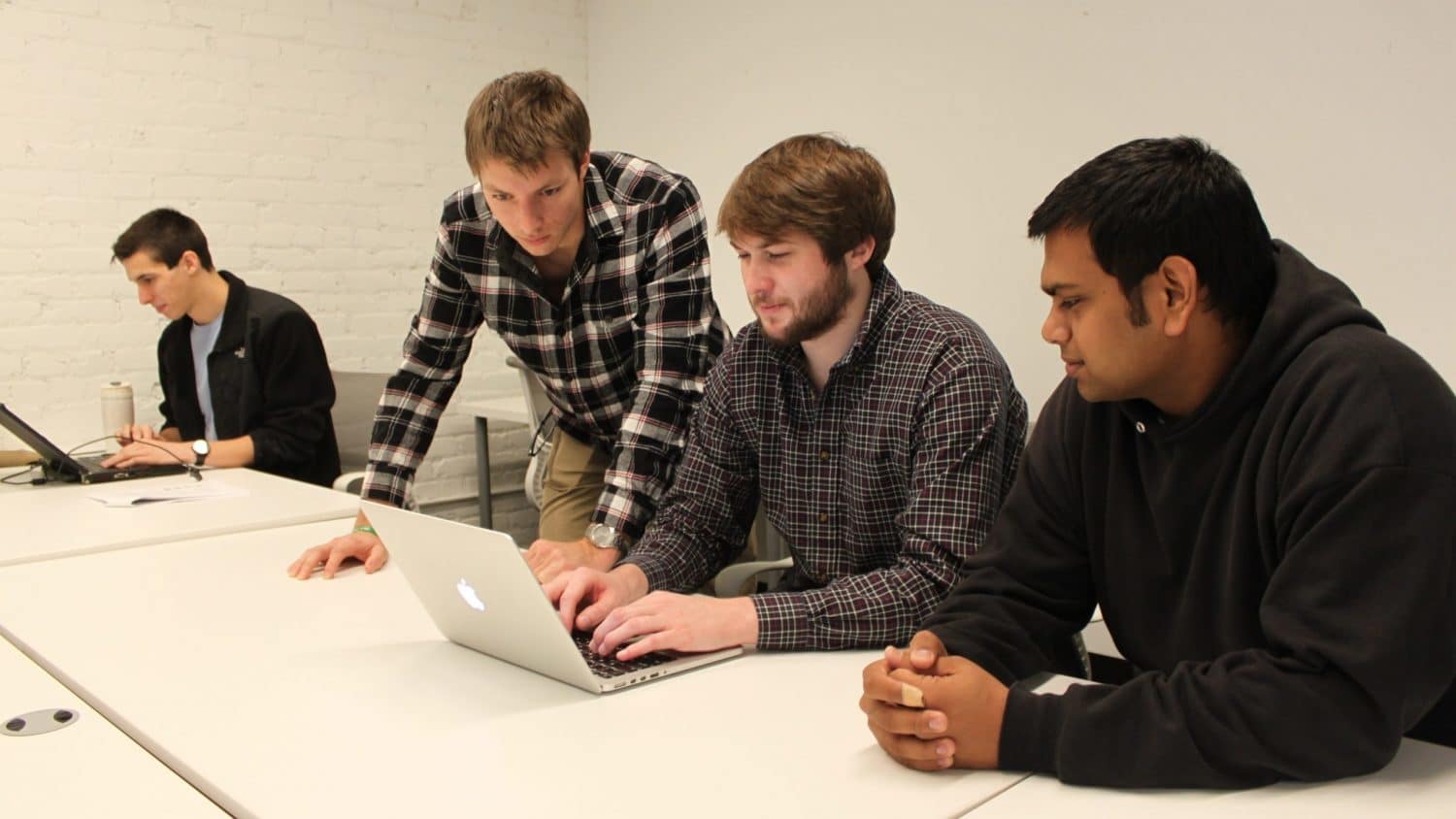NC State’s New Venture Studio Gives Students Entrepreneurship Experience

Few individuals have the opportunity to try their hand at developing a business process or product from the ground up before graduating from college, but Poole College of Management is trying to change that with its new program, the NC State Venture Studio.
The Venture Studio, like the college’s Andrews Launch Accelerator, provides NC State students valuable hands-on entrepreneurship experience. However, while the Andrews Launch Accelerator provides students with the funding, resources and guidance needed to take their own startup to the next level, the Venture Studio works with existing companies to expand their products, offerings or processes.
Through the NC State Venture Studio, Lewis Sheats, director of NC State’s Entrepreneurship Clinic, along with the clinic’s program manager Gabe Gonzalez and Tom Collopy, Assureware Executive in Residence, teamed up to connect with two innovative local companies making waves in the new product space. Last semester, a small group of students collaborated with two existing companies – Spencer Health Solutions and Vinventions – to create new and scalable concepts to validate as part of their coursework.
“We recruited eight students who demonstrated an aptitude for entrepreneurship,” explains Sheats, who also serves as the Entrepreneurship Clinic’s executive director. “Our goal was for the students to immerse themselves directly with these partner companies to build a spin-off company or create a new project or division that could quickly be scaled and launched.”
For Poole senior Thomas Armstrong, who will graduate in December with a degree in business administration and a concentration in entrepreneurship, this type of opportunity is the future of education.
“I truly believe these hands-on experiences are the most valuable part of education,” Armstrong says. Armstrong was on a Venture Studio team with fellow students Jeyashree Haridoss, Nick Triantafyllides and Lindsay Wrege. The team worked with Zebulon-based company Vinventions – one of the largest synthetic cork producers.
Vinventions approached the Studio with a desire to create a new unit that led a product strategy that has a positive impact on the planet.
“We wanted to partner with the Venture Studio to see how to inject some new thinking into a very traditional wine industry,” explains Jonathon Wang, vice president of commercial strategy for Vinentions.
“There is a public perception that artificial corks are less sustainable than real corks. While that’s not necessarily true, we recognized we needed to change the public perception,” Armstrong says.
His team developed more than 50 ideas before settling on a new model for cork collection via a circular economy strategy, which has opened the doors for Vinventions to create a profitable business unit that also has a positive impact on the environment.
Currently, Vinventions is piloting a version of the program with one of their winery partners to gauge public reception and maximize the recyclability of their corks.
“Our Venture Studio team had very good business instincts and I experienced a high level of capacity and talent from them,” Wang says. “They were exceptional in their ability to think in a very sharp and strategic way.”
Vinventions wasn’t the only company that saw immediate value based on their participation in the Venture Studio.
Triangle-based Spencer Health Solutions is a pill dispensing technology company that has seen major traction for its product in the clinical trial and commercial market. The company’s leadership team approached the Venture Studio to explore potential opportunities in the consumer vertical.
“Initially we wanted to find a way to leverage some of the energy and disruptive thinking that these students could bring,” says Eric Teague, Spencer Health’s chief operating officer and chief financial officer. “As a young start-up, our team is running 100 miles an hour handling the day-to-day operations, so the idea of bringing in a group with fresh perspectives was something we were interested in.”
Adithya Balaji, a senior electrical and computer engineering student, served on the Spencer Health team along with classmates Ryan Lynch, Jeyashree Haridoss and Blake Swaim.
“After speaking with the executives at Spencer, we learned that while the company had found success in Europe, they were struggling to find their place in the U.S. marketplace,” Balaji says. “We spent several weeks working to understand the nitty-gritty details of the medication adherence space.”
His team spent hours cold-calling independent living facilities, scheduling calls and video meetings with seniors to better understand the challenges they face in remembering to take their medications, and learning from caregivers how Spencer Health’s pill dispensing device could be beneficial in their everyday jobs.
“We looked at several different ideas for breaking into the U.S. market but ultimately decided a direct-to-consumer approach to the independent living market would be a strong segment for Spencer to pursue,” Balaji says.
This post was originally published in Poole College of Management News.
- Categories:


